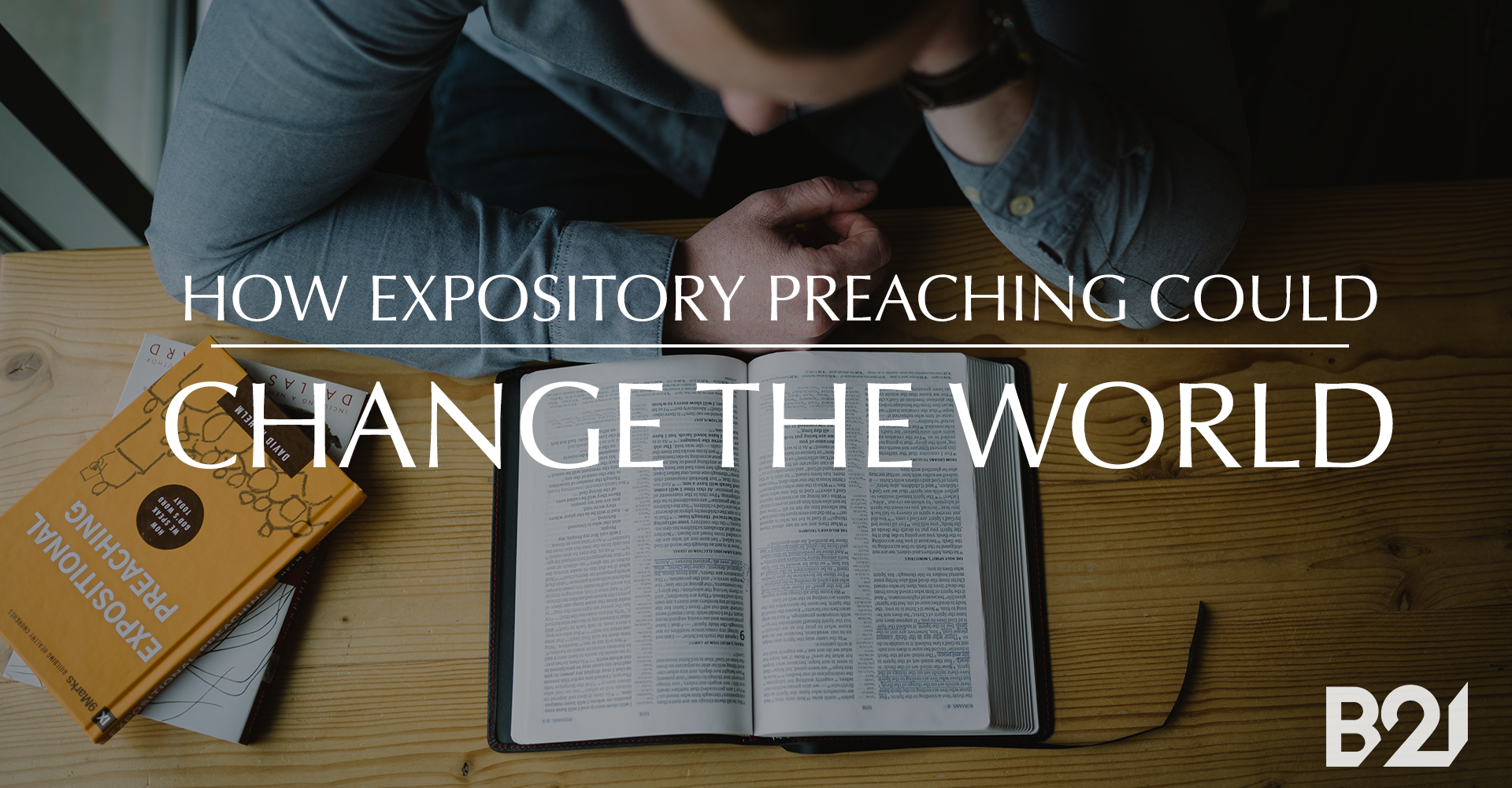How Expository Preaching Could Change the World
by Daniel Darling
As someone who believes the church should be about gospel proclamation and social action that obeys Jesus’ command to love our neighbor as ourselves, I encourage pastors to be unafraid to discuss important cultural issues in the pulpit. If people cannot find guidance on how to live in the world in church, they will find it in other ways. We are always being formed, but faithful churches ensure that God’s people are not being catechized by pundits, parties, and politicians.
But how does a pastor do this while also preaching, as I believe the majority of preaching should be, in an expository, book-by-book way? How can a preacher help his people live in the world without turning the pulpit into another segment on cable news?
This is where I think expository preaching, rather than a hindrance for equipping God’s people for life in the world, is a benefit. I’m not against topical weeks and occasional sermons that mark significant holidays, but we mostly grow by being fed a steady diet of God’s Word over a lifetime. Also expository preaching, done right, doesn’t let us skip those hard passages we’d rather avoid.
So how can we apply our expository preaching to the culture? Here are three ways I’ve found extremely helpful:
Balance the diet.
Let’s be honest. When those of us who areexpositors talk about preaching verse-by-verse, we mean “preaching verse by verse through the New Testament epistles because they are easier to divide.” I love preaching through epistles. I just recently finished an interim pastorate where I was able to walk through 1 Peter. It was glorious. But just as a nutritionist needs to ensure that her patients take in a healthy diet, so does a pastor. I believe this means we need to vary in our selection of books.
So, for instance, if we have just finished a series on Romans, perhaps it’s time to return to the Old Testament. Maybewe need to preach out of one of the minor prophets (a novel idea!). By doing this, we will expose our people to the breadth of Scripture, and we will be forced to preach sections in the Bible that will challenge their worldview and prepare them for mission. A balanced biblical diet at church means we will confront hard passages and see where the Bible conflicts with the many worldviews we encounter during the week.
Contextualize the application.
It’s possible to sit in church, hear good preaching, and never have it disrupt our way of life. If application is vague, the hearers will affirm what they hear, yet not think anything in their lives has to change. But a faithful shepherd looks at the Word and his people and asks, “Where does God need to change our thinking? Where do we need to repent and prevail upon the grace of God?”
If we think hard about application, we won’t be able to escape ways in which passages confront cultural issues. Even well-known passages like the Great Commission confront our views, for instance, on race. Jesus is saying to his disciples that the gospel is not just for the Jewish people, but every ethnos. That has profound implications for how we see the world. The gospel is bringing every nation, tribe, and tongue into the body of Christ.
Or, imagine the way we might preach through the Lord’s Prayer. Have you noticed the plural nature of this prayer? Jesus says, “Give us this day our daily bread.” This means that when I get on my knees to pray, I’m not just praying in dependence for my own sustenance, but I’m to consider and pray for the sustenance of those around me. So, expository preaching can be formative if we exegete the Scripture well, and if we know our people well.
Afflict the comfortable.
We need to be sure we are preaching in a way that, to paraphrase a newspaper maxim, “Comforts the afflicted and afflicts the comfortable.” We should preach to the sins and idolatries we wrestle with within our congregations. If I’m pastoring in a deep red state, for example, and my passage that week is Psalm 139, I should apply that passage to the issue of abortion. I should also apply this idea of the sanctity of life to other issues more conservative-leaning people might be tempted to ignore, such as the way we talk about immigrants and refugees or the way we think about those who live below the poverty line. If I’m pastoring in Berkley, California, on the other hand, and I’m preaching through Amos, I should apply that to the deep injustices my people are aware of, but I should not hesitate to bring up the injustice of abortion.
If we are not careful, we can easily preach and teach in a way that allows our people to remain comfortable, baptizing the status quo. If you heard expository preaching in 1940s Germany but it never applied to Hitler’s genocide of Jews, or if slave owners in the 1800s could hear the Word without being conflicted about the way they bought, sold, and treated other human beings, then that preaching failed to have its intended effect.
Faithful expository preaching exposes both the preacher and the congregation to the full counsel of God. Done well, this kind of preaching draws us into worship of the risen Christ and prepares us to live as his ambassadors in the world.
Check out Dan’s new book, The Dignity Revolution: Reclaiming God’s Rich Vision for Humanity.

